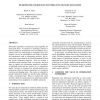Free Online Productivity Tools
i2Speak
i2Symbol
i2OCR
iTex2Img
iWeb2Print
iWeb2Shot
i2Type
iPdf2Split
iPdf2Merge
i2Bopomofo
i2Arabic
i2Style
i2Image
i2PDF
iLatex2Rtf
Sci2ools
112
Voted
WSC
2008
2008
Incorporating information networks into military simulations
Information superiority is considered a critical capability for future joint forces. As advances in technology continue to boost our ability to communicate in new and different ways, military forces are restructuring to incorporate these technologies. Yet we are still limited in our ability to measure the contributions made by information networks. We describe three recent studies at the Naval Postgraduate School that involve information networks. First, we examine a simulation model expanded from a two-person, zero-sum game to explore how information superiority contributes to battlefield results and how sensitive it is to information quality. Second, we examine how network-enabled communications affect the logistics operations in a centralized receiving and shipping point. The results are intended to provide operational insights for terminal node operations within a sustainment base. Third, we explore how social networks might be incorporated into agent-based models representing civ...
Future Joint Forces | Information Networks | Information Superiority | Modeling And Simulation | WSC 2008 |
Related Content
| Added | 02 Oct 2010 |
| Updated | 02 Oct 2010 |
| Type | Conference |
| Year | 2008 |
| Where | WSC |
| Authors | Darryl K. Ahner, Jonathon K. Alt, Francisco Baez, John Jackson, Susan M. Sanchez, Thorsten Seitz |
Comments (0)

